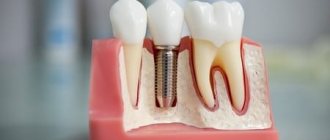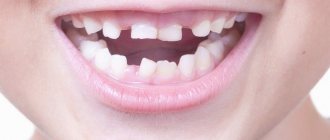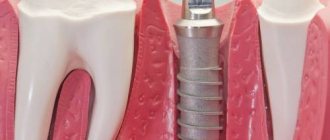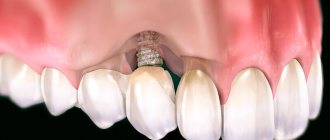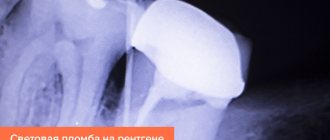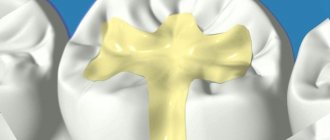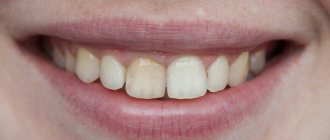21.11.2019
After dental implantation, the patient must carefully monitor the condition of the oral cavity and strictly follow all the doctor’s recommendations. This largely determines how fast and successful the healing process will be.
In addition to the patient’s age, as well as his existing diseases, the implant’s implantation is influenced by diet and bad habits, one of which is smoking. Patients who smoke know that they must abstain from cigarettes during preparation for surgery and immediately after it. However, many guards are interested in the question: when can you smoke after dental implantation, so as not to cause implant rejection and not interfere with the healing process?
What could be the consequences?
Most patients believe that the success of this operation depends solely on the specialist who implements the dental implants. If complications occur or the implant is rejected, almost 70% of people begin to blame the doctor and the dental clinic as a whole: they use cheap implants, save on consumables, doctors are not knowledgeable enough about this issue, etc.
In fact, this is not true at all. To a large extent, everything depends on the characteristics of the body and the patient’s behavior during the rehabilitation period. Some bad habits can seriously affect the success of surgery; let’s look at each of them in more detail.
How does nicotine affect the condition of teeth and oral cavity?
What consequences can a bad habit lead to:
- For a smoker, any dental treatment can result in complications, even a simple tooth extraction. Dry socket syndrome is often observed when a blood clot necessary for wound healing and protection does not form. The absence of a blood clot often causes alveolitis, followed by osteomyelitis, abscess, and phlegmon.
- Tobacco smoking slowly but surely leads to atrophy (thinning) of the jaw bone. Insufficient bone density is the main contraindication to implantation.
- Most smokers by the age of 30-35 have periodontal disease, as nicotine worsens the condition of the gums. This leads to weakening of the periodontal ligaments and loosening of the teeth.
- Smokers are more susceptible to oral infections.
- After bone grafting and implantation, the risk of foreign body rejection increases.
- Nicotine reduces the protective properties of salivary fluid, which accelerates the development of bacterial microflora. It also causes inflammation of the mouths of the salivary glands at the base of the palate.
- Provokes leukoplakia of the oral cavity, cancer of the mucous membrane.
- It disrupts the natural blood supply, so healing after any operation takes longer and is more difficult.
- The immune strength of the body as a whole decreases, which leads to exacerbation of chronic diseases and inflammatory processes.
- The high temperature of tobacco smoke leads to thinning of the enamel, increased tooth sensitivity, and discoloration of the crown.
Smoking
Smoking is another dangerous habit. We are not even talking about the effect on the entire body as a whole, but specifically on the condition of the oral cavity. Tobacco smoke contains many harmful impurities. They lead to deterioration of tissue nutrition. This is especially dangerous if the patient has undergone a sinus lift. Let's look at how tobacco smoke is harmful after implantation:
- When you inhale tobacco smoke, a vacuum is created in the oral cavity. This provokes the development of bleeding. Then the wound becomes open - pathogenic microorganisms can enter it and cause inflammation or infection.
- Kurene provokes dry mouth and impaired saliva production - this is an ideal environment for the proliferation of pathogenic microorganisms.
- Healthy cells in the oral cavity are actively dying - this increases the risk of dental implant failure.
Ideally, you should not smoke after implantation for at least one week. Although, not every patient follows this rule.
What complications do smokers experience after having implants installed?
After the implant is installed and has successfully taken root, the doctor attaches an abutment to it and then places a crown. After a few months, the patient completely gets used to the new tooth, can calmly eat any food and smile confidently.
For smokers, the healing process is not always easy and fast. It is often accompanied by a number of complications that you need to know about in advance.
Let's look at them.
- The process of repairing damaged tissue in smokers is two times slower than in non-smokers. Therefore, they should not consume sweets, certain drinks and solid foods for much longer. Many patients cannot withstand these restrictions, thereby increasing the risk of inflammation, suppuration, or dehiscence in the unhealed wound.
- A smoker's jawbone loses strength and elasticity, so it may simply not withstand the implant (break or reject it). Smokers are much more likely to need a sinus lift than non-smokers
- Tobacco tar and nicotine enter the implant through saliva, causing oxidation and damage. If this happens, the implant will have to be removed
- Smoking increases blood pressure in the capillaries, causing bleeding, bruising and swelling around the artificial tooth.
- Hot tobacco smoke has a bad effect on the condition of the seams, and they can come apart
- Nicotine tars provoke the formation of plaque, which is deposited on the teeth and eventually turns into tartar. The stone must be removed, otherwise it will put pressure on the crown, and the crown will put pressure on the implant. This may lead to his rejection
- Hot smoke causes burns to the mucous membranes, which increases the risk of developing peri-implantitis by 40%. A wound with pus forms on the gum, which puts pressure on the metal rod, displacing it
Useful tips
It is not so easy for long-term smokers to give up the bad habit. In this case, experts advise stopping smoking completely for at least two days after surgery, and then significantly reducing the number of cigarettes per day. As for alcohol, there are no concessions here; you need to wait until the mucous membrane has completely healed.
Take dental implants more seriously. Remember that this is a full-scale operation. Since you have decided to restore using this method, try to follow all the recommendations of your doctor.
Important questions about dental implants
Will I get natural and beautiful teeth? It seems to me that the crowns will be noticeable in any case.
Implants are artificial roots for crowns, dentures and other orthopedic structures.
Thanks to them, the teeth feel like real ones, receive adequate physical activity, and do not move. Installation of a bridge does not require damage to adjacent healthy teeth. As for the aesthetic side of the issue, not a single crown or prosthesis is finally attached before the patient accepts its appearance. We offer each client an individual solution, taking into account requirements and wishes, trying to choose the ideal shape and color scheme. The dentist tries on the finished crown or prosthesis and only after the patient’s consent securely attaches it to the implant.
How many doctor visits are required?
It all depends on the individual factors of the clinical case. As a rule, one consultation is enough to decide on the type of operation and its volume. Then you need to take tests and accurately determine the date of installation of the implant, the type of anesthesia and many other nuances. The actual surgical intervention is performed once, very rarely twice. Then after a few days the situation is controlled, and after 10 days the stitches are removed. The healing period does not require visits to the dentist, but only if it progresses adequately.
Can I exercise after getting implants?
In general, it is not prohibited to move without overload, but you need to wait at least 2-3 weeks after the operation. It is recommended to discuss the issue with your dentist in advance to determine the acceptable type of sport and optimal loads.
What care is required for crowns installed on implants?
Care for artificial teeth in the same way as before for real teeth. No additional tricks are required. Choose a suitable toothbrush and toothpaste, clean the crevices between the teeth and the junctions with the gums. Use dental floss to remove food debris between your teeth. Do not forget to visit the dentist 1-2 times a year for preventive purposes.
Can installed implants cause an allergic reaction?
There are no known cases of allergic reactions to titanium structures in medicine. This material has long been used in traumatology, dentistry and other industries, as it is not rejected by the body. Titanium implants are additionally covered with protective layers and perfectly imitate a real tooth root. Therefore, the occurrence of allergies is impossible.
Will I have any pain after surgery?
The presence and severity of pain depends on the individual characteristics of the body. Some patients do not require analgesics the very next day after surgery. However, pain will definitely occur if you refuse to take medications prescribed by your doctor according to the regimen. You can find a list of them and admission rules in the NB-After card. The necessary medications are in a special white bag.
Can implantation be performed on minors? What age is considered optimal?
Implantation is permitted and is carried out only after the formation of the osteoarticular apparatus of the jaw is completed. As a rule, this occurs by the age of 18, but in individual cases it is delayed for longer periods. Therefore, implantation is definitely not performed on minors. And the possibility of its implementation in older patients is determined using radiographic examination.
When may it be necessary to restore alveolar ridge bone tissue?
In 90% of cases, patients require bone grafting because the jawbone is thinned and is not suitable for implantation. There are plenty of reasons for this: long-term absence of a tooth, low loads on the bone, inflammatory processes, prolonged wearing of any dentures (only implants stop the process of bone resorption).
There is no need to be afraid of bone grafting, because modern technologies have eliminated any risks associated with it. In addition, the restored bone volume guarantees adequate fixation of the implant.
How long will the implant last?
A correctly installed high-quality implant is an ideal imitation of a tooth root. It withstands chewing loads, does not become loose, and does not become less reliable. Implants do not have to be replaced throughout your life, so they are the optimal solution for restoring teeth. It is better to place an implant once than to constantly change removable dentures.
Will I have to go without teeth while the treatment and healing process takes place?
Of course not. If you wore a removable denture before getting an implant, you can put it back almost immediately after surgery. In other cases, the doctor individually selects a temporary prosthesis. Sometimes removable temporary structures are installed for long-term wear. They are attached directly to the implant.
I had surgery and was sent home. What should you do right away?
The first few hours after installation of the implant, you should cool the cheek externally to prevent or at least reduce the severity of swelling. To do this, prepare ice cubes or cold compresses. Recommendations for the postoperative period are written down in the NB-After card. Read it carefully and follow the instructions exactly.
What are dental crowns made of?
Most patients get structures made of metals coated with ceramics to match the color of the teeth. Such structures are strong, reliable and indistinguishable from real teeth. Only when exposed to direct rays of light will the metal inside be visible. Solid ceramics are also used for crowns without the use of metals. It gives the perfect aesthetic appearance to your smile. It is used for both individual crowns and bridges.
What to expect from a consultation?
An initial consultation with a dentist is not something super special. The doctor will assess and discuss your situation, conduct an examination of the oral cavity, suggest the best ways to solve the problem, and prescribe a series of studies. Come to your consultation with old dental photographs, if available. Bring all medical documentation. Don't forget to tell your doctor about your chronic diseases and list the medications you take regularly. Be sure to report any allergies to medications. Don’t be afraid to ask provocative and simply clarifying questions, don’t be afraid to demand certificates and licenses.
I want to get implants, but in the future I plan to lighten my teeth and improve their aesthetic appearance. What should I do?
Feel free to contact our specialists with this problem. Yes, implants are matched to the color of the patient’s tooth enamel. However, our doctors can lighten the teeth using special plates called veneers. They will not only improve the color of your teeth, but also correct cosmetic defects in their shape.
Should smokers get implants?
Previously, smokers were dissuaded from undergoing implantation, since it cost a lot of money, and the result quickly returned to zero due to constant smoking. Modern technologies and materials reduce the risk for smokers and the long-term service life of implants and crowns on them is reduced only with insufficient oral hygiene. If you are concerned about the appropriateness of implantation, discuss this issue with your dental hygienist. He will select individual procedures.
How and when are crowns placed on implants?
In modern conditions, permanent crowns are placed after implants have healed, which occurs within 3-4 months. Duration varies slightly. The process itself consists of: removing temporary crowns, removing a sealed plug, making an impression and shaping the gums using special caps. The dental laboratory creates an individual crown for each patient. Then the fitting takes place and only after this the crown is securely fixed. It happens that you have to adjust the size and shape of the crowns several times so that they do not differ in any way from real teeth.
Are implants placed after tooth extraction?
Certainly. This treatment option is considered one of the most optimal, since the bone tissue does not have time to dissolve. With this type of implantation, bone grafting is often not required. The titanium structure is fixed into the socket from which the real tooth was removed. Further engraftment and further fixation of the crowns proceed as standard.
Do not confuse implantation after tooth extraction and implantation with immediate loading.
What is immediate loading implantation?
In rare cases, when the patient does not undergo bone grafting or, according to individual indications, the operation is performed with immediate loads. That is, a high-quality permanent crown is fixed to the implant immediately after its installation. There is no need to wait until engraftment occurs.
Do I need to remove removable dentures attached to implants before going to bed?
No need. Any crowns or complete removable dentures are very securely fixed to implants, so there is no need to remove them at night. People usually remove their dentures before going to bed to prevent them from shifting and blocking their airways. Dentists always warn patients about this risk. However, technologies for fixing prostheses on implants have eliminated this problem. Therefore, you can sleep peacefully in dentures without risk to health and safety of structures.
How do implants differ from each other in terms of quality?
Implants come in different types and types, depending on the method of implantation. However, the most optimal, safe and predictable option is the classic installation of titanium structures. In appearance, the patient will not be able to distinguish one implant from another, since they are all similar to an ordinary screw. But professionals know that there is a difference in quality.
Modern Nobel Biocare implants are manufactured using a special coating that accelerates bone growth and implantation of the structure. Our clinic only uses implants with a coating that is invisible to the human eye. We have been using Nobel Biocare implants with TI-Unite surface for over a decade and have never been disappointed with their quality.
Is implantation performed under general anesthesia? What kind of anesthesia is used for dental implantation?
No, general anesthesia is not performed. There is no pain or discomfort at all when implantation is performed under local anesthesia. The patient may feel slight vibration or pressure, but no pain. For those people who are terrified of surgical interventions and want to undergo general anesthesia, it is recommended to consult with the treating dentist. He will assess the possible risks and help the patient make the right decision.
I want to change the prosthesis, which is fixed to the implant. Can this be done?
Yes. Whenever. Any dentures or crowns that are attached to implants can be replaced or updated. Moreover, a single implant can be converted into a support for a bridge at any time. The designs used in our clinic are compatible with various individual orthopedic solutions.
Are there diseases for which implantation is prohibited?
There are no specific diseases that would become an obstacle to implantation. However, there is such a thing as the general condition of the patient. If you have serious chronic diseases and they are decompensated, there is organ failure, then no one will perform an operation on you. Only after the condition has stabilized.
When contacting an implantologist to install titanium structures, be sure to inform him about the presence of any pathologies in the body. The doctor will be able to prescribe additional medications and eliminate possible risks. Do not hide the characteristics of your body from the dentist, because this will only increase the chance of an unfavorable outcome of treatment.
Is implantation performed in patients with diabetes?
Yes, it is carried out. However, only after specially corrective treatment aimed at achieving compensation for the patient’s general condition. A similar adjustment can be made in our clinic. Patients with decompensated diabetes mellitus, high sugar levels, and severe complications first normalize their condition and only then can count on implantation. Such precautions are due to the fact that in patients with high sugar levels, wounds heal poorly and the risk of infection is increased.
Can the implant become inflamed and what should I do?
Yes, indeed, in the absence of regular oral hygiene or when immunity is reduced, an inflammatory process can occur. If you consult a dentist in time, then there will be no problems with his treatment. And with regular preventative visits to the doctor, proper brushing of teeth and a generally healthy lifestyle, there is no need to worry about such a problem.
What complications are there?
Previously, complications did occur and not as rarely as we would like. But modern technologies for installing implants and planning surgery make it possible to eliminate all possible risks. The only problem that periodically arises is insufficient fixation of the implant in thinned bone tissue. But the complication, as a rule, is provoked by patients’ refusal to undergo bone grafting. In such cases, the implant is moved under local anesthesia.
I wear a removable denture for the entire jaw, which is constantly moving. I want to install implants, but attach an existing prosthesis to them. Can this be done?
For reliable fastening of a complete removable denture, four titanium structures are sufficient. Your denture can be placed on implants if it is comfortable for biting and chewing and will also provide your jaw with adequate exercise. The fastenings on the implants are so strong that you can immediately forget about displacements. To evaluate the condition of your jaws, your dentures and make the right prosthetic decision, consult with our dentist.
Will I be able to feel which teeth are real and which are not?
No. Implants and modern dentures make it possible to achieve a perfect imitation of natural teeth. You won't feel any difference when you smile, bite into an apple, or chew your food. Only professional dentists can notice the differences, and sometimes only with the help of special equipment.
Are there any dietary restrictions?
No. Implants with crowns, bridges or any other structures attached to them can withstand standard chewing loads without any problems. That is, you should not open a bottle with your teeth - even a natural tooth will not withstand this. But you can eat solid foods like apples or nuts with complete peace of mind.
After surgery, is it preferable to sit or lie down?
We are all accustomed to the fact that after surgery we need to lie down for several days or at least hours. However, in dentistry the situation is the opposite. The horizontal position promotes a rush of blood and lymph to the head, which causes severe swelling and increased pain. Therefore, it is better to spend the first hours after implantation sitting. A short walk in the fresh air will also be beneficial. But don’t overwork yourself – physical activity is prohibited. And try not to bend over.
How soon can you eat and drink?
If you feel thirsty, be sure to drink water at room temperature. However, food and other drinks should be delayed until the local anesthesia wears off. The precaution is due to the fact that the patient may unintentionally damage the wound surface or burn the mucous membranes.
What to eat after surgery?
Eliminate from your diet hard, sticky, floury foods that take a long time to chew or their remains stick to the mucous membranes of the mouth. You can eat light soups, soft cutlets, mashed potatoes. Food should require a minimum of chewing movements. But no yogurt! We also exclude sweets for the first time. You need to eat such food before the stitches are removed, and then you can return to your usual diet.
They say that after installation of implants you should not drink coffee. This is true?
Coffee lovers can safely continue to drink it after implants are installed. You should avoid drinking it, as well as strong teas and highly carbonated drinks, in the first days after surgery. These drinks increase blood pressure, which can cause bleeding.
Is it allowed to chew on the side of the installed implant?
Until the stitches are removed, it is prohibited! Don't be afraid if food gets on the wound. After finishing using it, you should carefully rinse your mouth with warm water each time. However, you need to chew exclusively on the healthy side.
When can I brush my teeth?
A day after surgery, feel free to start brushing your teeth. Moreover, you must start cleaning them to prevent inflammatory processes. When cleaning, walk around the wound surface. It is recommended to use a soft brush so that accidental contact with the bristles on the wound does not damage its edges and seams. The use of irrigators and any mouthwash is prohibited. You should also avoid using an electric toothbrush for a while.
Will there be pain after the local anesthesia wears off?
Yes. The first hours and even days after surgery will help you with a regular analgesic. Take it strictly as directed. The first night after surgery, sleep on a high pillow to allow blood and lymph to flow away from your head. The intensity of the pain syndrome depends on the scope of the operation and the individual characteristics of the body. But gradually the pain will go away. Some clients do not take painkillers within 24 hours after surgery.
Is the wound highly sensitive?
No, and every day the sensitivity decreases. To avoid causing pain or irritation, do not touch the wound with your tongue or fingers. Healing is very fast.
What to do if blood flows?
In the first days after surgery, slight bleeding may persist. It is considered physiological and does not require any action on the part of the patient. Saliva may be slightly pink in color. But the bleeding quickly stops and is almost invisible to patients. If blood flows unexpectedly a few days after the operation, and before that everything was fine, you should immediately consult your doctor.
How long does it take for stitches to be removed?
The date for suture removal is determined individually by the implantologist and depends on the extent of the surgical intervention and some other factors. On average, sutures are removed after one to two weeks.
What do you do after the stitches are removed?
Nothing at first. The next stage is carried out after 5 weeks - the patient is fitted with a gum former. After this, an individual crown or bridge, or a prosthesis for the entire jaw, is made on the implants.
Will the healing abutment interfere?
It will be noticeable in the mouth, but will not cause serious discomfort. Patients usually get used to its presence within a few hours. In addition, they do not wear it for long.
Why is it worth paying attention to the connection between the crown and gums?
This area is the best place for bacteria to penetrate into the gums and even bone tissue. This is accompanied by the occurrence of serious inflammation, which, if the process is neglected and there is no correct treatment, can even lead to the loss of the titanium structure. It is especially important to thoroughly clean the joints in the first year after surgery, when the implant is actively healing.
Are irrigators necessary for proper care?
Until the wound heals and the stitches are removed - definitely not. In general, there are two sides to the coin: irrigators can clean the oral cavity well, but their excessive use can lead to damage to the gums and the penetration of bacteria into it. If you are used to using irrigators, continue, but don’t overdo it! And if you have never used them, then there is no need to start.
Can I use whitening toothpastes?
Yes, but not often. The substances it contains have a very aggressive effect on the crown, which leads to damage to its surface. Consequence: rapid discoloration, accumulation of bacteria, formation of tartar.
Can an unexpected reaction occur if I take medication regularly?
Yes. Cases of cross-reactions are known, so you should list to your dentist all the medications that you have to take on a regular basis. This is especially true for drugs that reduce immunity and blood thinners.
When can I return to work after surgery?
As a rule, you can return to work the next day. But this issue is discussed individually with the dentist. If there is significant swelling, then it is better to sit at home for a day.
How much money will you have to spend?
Our clinic uses a turnkey package implantation system. Its cost will be from 60 thousand rubles . The price of crowns and prostheses is determined individually and depends on the fixation option. In general, the average cost of crowns in Moscow is from 35 to 55 thousand rubles.
What is a batch system?
We offer a fixed price for turnkey implantation, which includes a number of necessary surgical steps. That is, the clinic does not have separate price tags for crowns, anesthesia, and so on. After assessing the clinical case and determining further tactics, the dentist names one amount that will include all stages of treatment. Price includes:
- Cost of the implant itself;
- Cost of the operation, including sterile instruments and consumables;
- Cost of bone grafting and materials for it;
- Applying and removing sutures;
- Control visits to the dentist and necessary examinations;
- The second stage, which includes anesthesia and installation of the shaper.
After this, a crown or prosthesis is selected, which are paid separately.
What is Nobel Biocare?
Nobel Biocare designs are high quality implants. During their production, starting with the supply of materials, each stage is certified and strictly controlled. The design of the implants is clearly calibrated, and their range will allow you to choose the best option even in the most difficult clinical situations. The implants have a specific TI-Unite surface, which is similar in composition to the dentin of natural teeth. This allows for faster healing and increased reliability of implant fixation in the bone.
I have bruxism. Is it possible to get implants or does it make no sense?
Can. In addition to the fact that the implants can withstand standard chewing loads, and the crowns are made of very durable materials, patients with bruxism are recommended to use special mouth guards. They will help reduce stress on your jaws, teeth and joints. Consult with our dentists how best to solve the current situation.
What care is required for dentures and implant crowns?
Care for bridges, crowns, and other dental restorations just as you would for natural teeth. Clean them twice a day, use dental floss, and periodically visit the dentist for preventive purposes. The only point: when brushing your teeth, pay special attention to the spaces between the teeth and the places where the crown comes into contact with the gum.
Is it possible to perform implantation with increased pressure?
Hypertension is a very common pathology. If your treatment regimen for the disease has been completely adjusted, and your blood pressure numbers remain in the same range, then there will be no problems.
How to care for your gums after having a retainer installed?
A short time should pass between the formation of the gums and the placement of the crown. During this period, no special care products are required. It is recommended to brush the area with the former in the same way as you would your teeth, but use a soft brush. Sometimes the doctor puts stitches that are better avoided. The shaper must be completely motionless. If you feel any changes in its location, consult a doctor immediately. Don't try to fix the situation yourself.
Is it possible to do without bone grafting?
Many patients are afraid of sinus lifting because of the imaginary complications that the Internet promises. However, modern techniques for carrying out the procedure have eliminated any risks. Deficiency of the alveolar ridge of the upper jaw occurs in almost all clients, and bone grafting is the key to reliable fixation of the implant.
Can I use an electric toothbrush after implantation?
Certainly. An electric toothbrush cleans your teeth just like a regular toothbrush. Therefore, implantation is not a contraindication for its use.
How often should you visit the dentist after implantation?
If all stages of treatment are completed successfully, then it is recommended to undergo preventive examinations of the oral cavity 2 times a year or at least 1 time a year. This allows you to identify problems at the initial stages and avoid complications.
What are the contraindications for implantation?
There are no absolute contraindications to surgery. Any problem can be solved. But implantation is postponed during pregnancy and lactation, acute inflammation in the oral cavity, and severe decompensated chronic diseases. First you need to carry out corrective treatment, and then proceed with implantation.
Are healthy teeth damaged when dental bridges are installed?
No. Fixing bridges on implants avoids grinding down healthy teeth, which is a definite plus. In addition, implant-fixed dentures and crowns help restore physiological stress to specific areas of the jaw, making healthy natural teeth last longer.
Causes
There are several destructive aspects that prevent the body from adapting. Firstly, due to inhalation of hot smoke, the delicate tissues of the oral cavity are regularly injured. The result is an ordinary burn, which prevents all damage from healing and the foreign body from successfully taking root. In this case, the chances of developing peri-implantitis greatly increase.
Secondly, during smoking the level of salivation decreases, which significantly dries out the thin gum tissue. This causes the development of a huge number of harmful bacteria, which in the future can cause the above-mentioned peri-implantitis. This leads to implant rejection.
Thirdly, nicotine has a detrimental effect on blood vessels. They are located in large numbers in the mucous tissues of the oral cavity and in the upper layers of the jaw itself. Under the influence of the substance they undergo prolonged spasms. This reduces the level of blood supply, therefore, the amount of oxygen and nutrients decreases. This also worsens the healing situation. As a result, there is a risk of implant rejection.
Myth #5: Age restrictions
Sometimes patients do not consider the option of restoring teeth with implants and choose less comfortable removable dentures, thinking that due to the patient’s age, the installed implants may be rejected.
In fact, age is not an absolute contraindication for dental implantation. Agree, age and tooth loss are interconnected things.
In fact, age may be a contraindication if the patient cannot fully brush his teeth on his own and has serious diseases that prevent implantation. To get a consultation
Relationship between smoking and complications after sinus lift
Long-term studies show that smoking patients (category I) have a significantly higher risk of complications after dental surgery than non-smokers (category II). The level of the problem is truly amazing:
- minor complications were observed in 50% of patients from category I and 23% from category II;
- severe complications - in 33% of category I and 7% of category II.
Minor and common complications after surgery include:
- the appearance of a fistula;
- minor inflammatory processes;
- sinusitis and sinusitis;
- disturbances in the level of fluid in the bone;
- swelling;
- temporary paresthesia.
Severe and quite rare include:
- damage to the integrity of the membrane or lining of the maxillary sinus;
- high temperature (up to 40°), accompanied by heavy bleeding;
- entry of the implant into the sinus;
- weak or strong mobility of the implant.
All these complications can be caused by smoking after sinus lifting and bone grafting . The effectiveness of implantation in the area of the maxillary sinuses has a clear connection with the use of tobacco products - the failure of implants in category I is 3 times higher than in category II. To understand why this happens, you need to understand the effect of smoking on the body in more detail.
Optimal implant models for smokers
The basal protocol uses special implants that are implanted into the deep and sterile layers of the jawbone. They have a smooth antibacterial coating that prevents the spread of inflammatory processes. A popular brand is Oneway Biomed. But this solution is only for those who have already lost all their teeth, and they need to be restored comprehensively.
With the classic two-stage protocol, it is also important to select implant models that are appropriate for the tasks. Doctors prefer implants with an ultrahydrophilic surface coated with phosphorus molecules or fluoride ions. This coating helps improve osseointegration, which means that such structures will take root much faster. These include, for example, Nobel Biocare brand implants with TiUnite and TiUltra coatings or Straumann with SLActive surface.
Myth No. 6: Implantation is impossible if the jaw bone is atrophied
Indeed, if the jaw bone tissue is too “thin” or “loose”, then there is simply no place to place a dental implant. For this reason, some dentists even refuse implantation to the patient.
If you were denied implantation, then most likely your dentist does not know the technique of jaw bone augmentation. Jaw bone augmentation is a technique that allows you to fill the missing volume of bone tissue for implantation. The most common osteoplastic surgeries are:
Sinus lifting is a surgical change in the relief of the bottom of the Maxillary sinus. It involves lifting the membrane lining the bottom of the sinus and filling the resulting space with artificial bone granules.
Guided bone regeneration surgery or GBR. The essence of this operation is to graft bone into the atrophied area and fix it with a barrier membrane.
Splitting of the narrow alveolar ridge. The operation involves thin cutting of the alveolar process of the jaw bone, spreading its edges and filling the resulting space with bone granules.
Augmentation with bone blocks - the surgical technique consists of taking from one area (most often the mental or retromolar) and transplanting a piece of bone into the atrophied area of the bone.
Myth #4: Implant rejection
Most often, when hearing the word “implantation,” patients have a direct association with organ transplantation, and they naturally project this onto dental implantation. In fact, there is a huge difference between the engraftment of a donor organ and a dental organ.
A dental implant, unlike a transplanted organ, is integrated into the bone tissue (osseointegration) rather than engrafted.
Osseointegration is the process of ingrowth of bone cells into the complex surface of a dental implant.
Thus, the implant is securely held in the jaw bone. The healing process can be affected by infection of the tissues surrounding the dental implant, excessive stress on the implant, failure of the surgeon to follow the implant installation protocol, and the use of inappropriate equipment and instruments.
Implantation recommendations for smokers
Not everyone is able to give up a bad habit and quit smoking. In any case, the doctor recommends eliminating tobacco consumption two weeks before installation of the implant and at least in the first month during the engraftment stage. If the patient is a heavy smoker, this fact must be taken into account and treatment adjusted. There are several recommendations that can minimize the harm of cigarettes and make treatment more predictable.
- It is recommended to install top systems with an advanced hydrophilic coating, which promotes the formation of bone tissue around the implant and accelerates osseointegration.
- Smokers are not recommended to carry out a one-stage implantation protocol, since in this case there is a high risk of implant rejection and the development of inflammation.
- Basal implantation. Basal implants are installed in deep layers of bone that are not subject to atrophy, which is a plus for a smoker. However, this method has its own nuances that must be taken into account.
- Smokers need more careful hygiene using an irrigator, and it is also recommended to make preventive visits to the doctor more often.

